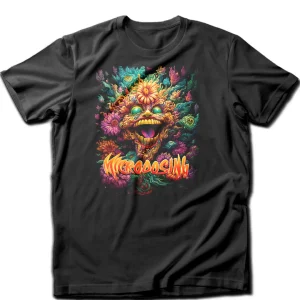How They Change Your Brain
Psychedelics like psilocybin, LSD, and DMT are well-known for their mind-altering effects, but what exactly do they do to the brain? Thanks to advances in neuroscience, we’re beginning to understand how these substances affect brain function, perception, and even emotions. This research is helping to explain why psychedelics might be useful for treating mental health conditions.
In this article, we’ll break down how psychedelics work in the brain and why they hold such exciting potential for therapy.
What Happens in Your Brain on Psychedelics?
When someone takes a psychedelic, the brain’s serotonin 5-HT2A receptors are the main players. These receptors help control things like mood, thoughts, and perception. When a psychedelic binds to these receptors, it triggers a series of changes that affect how different parts of the brain talk to each other.
1. Increased Brain Communication
One of the key effects of psychedelics is that they make different areas of the brain communicate more with each other. Usually, certain parts of the brain work together while others stay separate. But when psychedelics are involved, this changes. Brain regions that normally don’t interact start connecting, which can lead to new insights and creative thinking. This increased communication might also help people break free from rigid thought patterns, like those seen in depression.
2. Turning Down the Default Mode Network (DMN)
The default mode network (DMN) is a part of the brain that’s active when you’re daydreaming, thinking about yourself, or reflecting on the past and future. It’s responsible for what’s called “self-referential thinking.” While this can be useful, it also plays a role in rumination and negative thinking in people with depression or anxiety.
Psychedelics reduce activity in the DMN, which can lead to what many describe as an “ego-dissolution” or a loss of the sense of self. People often feel a greater connection to the world around them and may have profound experiences of unity or spirituality during a psychedelic trip.
How Psychedelics Change Perception and Emotions
Psychedelics don’t just change how we think; they also shift how we experience the world. People who take psychedelics often report changes in how they see time, colors, and sounds. They might also feel a deeper emotional intensity. These effects are linked to how psychedelics increase communication between different sensory and emotional areas of the brain.
1. Time Feels Different
One of the common experiences during a psychedelic trip is the feeling that time is either speeding up or slowing down. This happens because psychedelics interfere with how the brain processes sensory information, which includes our sense of time. Many people describe a sense of timelessness or being “in the moment” while on psychedelics.
2. Stronger Emotions
Psychedelics can heighten emotional experiences, making feelings of joy, awe, or even fear more intense. This happens because these substances change how emotional and cognitive areas of the brain communicate. This emotional amplification can be therapeutic when guided properly, helping people confront difficult emotions and gain new perspectives.
The Therapeutic Potential of Psychedelics
The way psychedelics affect the brain could explain why they hold so much promise for mental health treatments. Research suggests that psychedelics could help with a variety of conditions by loosening rigid thought patterns and fostering emotional breakthroughs.
1. Helping with Depression and Anxiety
For people with depression and anxiety, their brains often get stuck in negative thought loops. By reducing activity in the DMN and increasing brain connectivity, psychedelics help break these loops. Studies show that even one session with a psychedelic, such as psilocybin, can lead to significant improvements in mood, especially for those with treatment-resistant depression.
2. Treating PTSD
Psychedelics, especially MDMA, have shown great promise for treating post-traumatic stress disorder (PTSD). They allow individuals to re-experience traumatic events in a safe setting, helping them process and heal from those memories. The emotional openness that psychedelics encourage can make psychotherapy much more effective.
3. Addressing Addiction
Psychedelics may also help people overcome addiction by disrupting the habitual thought patterns that drive addictive behavior. Studies have shown that psychedelics, like psilocybin, can reduce cravings and help people gain insights into their addiction, leading to long-term recovery.
Long-Term Changes in the Brain
One of the most exciting things about psychedelics is that their effects on the brain don’t just end when the trip is over. Many people experience lasting changes in how they think, feel, and behave. But what’s happening in the brain to cause these long-term effects?
1. Boosting Neuroplasticity
Psychedelics enhance neuroplasticity, which means the brain becomes more adaptable and capable of forming new connections. This increase in neuroplasticity is one reason why people feel more open to new ideas, behaviors, and ways of thinking after a psychedelic experience. For those struggling with mental health issues, this can be a breakthrough in breaking old, harmful thought patterns.
2. Processing Emotions
Psychedelics make people more emotionally open, which helps them process deep-seated emotions. This emotional processing doesn’t just happen during the trip itself—it often leads to lasting changes, allowing people to integrate their emotions and experiences in healthier ways.
Conclusion: A New Era of Brain Research
The neuroscience behind psychedelics is opening up new possibilities for mental health treatment. By increasing brain connectivity, reducing the default mode network’s activity, and boosting neuroplasticity, psychedelics are offering a powerful way to reshape the brain. While there’s still much to learn, early research suggests that these substances could revolutionize how we treat depression, anxiety, PTSD, and addiction.
As scientists continue to explore the brain’s response to psychedelics, we may soon see a major shift in how mental health care is approached, offering new hope to millions of people worldwide.

